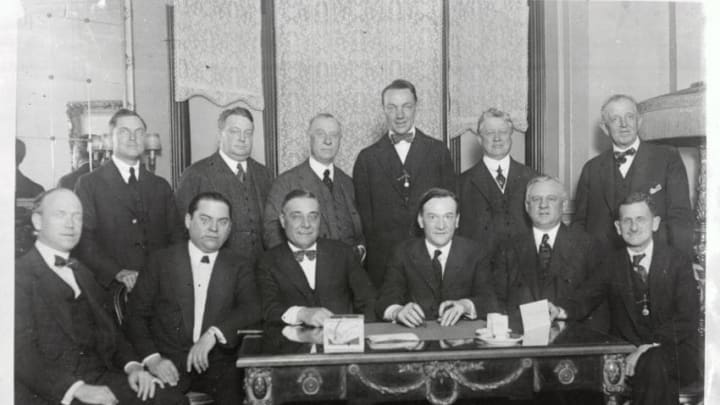The architect of the early Pittsburgh Pirates dynasty, Barney Dreyfuss comes in at number 15 on the all time general manager list.
(Louisville Colonels, 1897-1899; Pittsburgh Pirates, 1900-1931)
A German emigree, Barney Dreyfuss settled in Louisville as a young man, and got a job making Kentucky bourbon. But his fancy quickly turned to baseball, a passion he exercised by organizing distillery teams and then purchasing an interest in the Louisville Colonels of the American Association.
When the National League swallowed the Association in 1892, Dreyfuss made sure his Colonels were among the survivors. By the middle of the decade he was majority owner.
Those were the days of syndicate baseball, and Dreyfuss aligned Louisville with the Pittsburgh Pirates franchise owned by William Kerr.
More from Call to the Pen
- Philadelphia Phillies, ready for a stretch run, bomb St. Louis Cardinals
- Philadelphia Phillies: The 4 players on the franchise’s Mount Rushmore
- Boston Red Sox fans should be upset over Mookie Betts’ comment
- Analyzing the Boston Red Sox trade for Dave Henderson and Spike Owen
- 2023 MLB postseason likely to have a strange look without Yankees, Red Sox, Cardinals
As a team, the Colonels weren’t much, but Dreyfuss had several budding stars, among them Honus Wagner, Fred Clarke, Deacon Phillippe and Rube Waddell. The NL consolidated from 12 to eight teams before the 1900 season, collapsing the Louisville franchise, so Dreyfuss bought out Kerr and moved the best of the Colonels to Pittsburgh.
The result was the 20th Century’s first dynasty. With Wagner the centerpiece of the offense, Clarke operating as player-manager and a mound staff featuring Jack Chesbro, Phillippe and Sam Leever, the Pirates rode to three straight National League pennants.
The last of those culminated in an appearance in the first modern World Series, which Pittsburgh lost to Boston in 1903.
There was no such thing as a general manager in those days, but Dreyfuss — a hands-on owner — assumed many of the duties, especially in the early days of his ownership- His only major personnel mis-step involved allowing Clarke, a noted disciplinarian, to dump the eccentric Waddell, who became a star with the Philadelphia Athletics. Although they won just one more pennant in the next decade, the Pirates were consistent contenders through that period.
Dreyfuss’ secret was his uncanny ability to identify talent at an early stage and then hold on to it. At -23.6 games, he ranks a pedestrian 109th in career short-term improvement. Contrast that with his first place rank in career long-term improvement, +325.5 games. That number is 40 points better than the No. 2 ranked GM, and more than four standard deviations better than the historical average for all GMs of +47.57.

Pittsburgh Pirates
It took Barney a long time to turn around his bad teams, but once built, his clubs stayed built. Here are the tenures for several prominent Dreyfuss-era Pirates: Clarke, 15 seasons; Wagner 18, Tommy Leach 13, Deacon Phillippe 12, Babe Adams, 18, Lefty Leifeld 8, George Gibson 12, Howard Camnitz 7, Max Carey 16, Wilbur Cooper 12, and Carson Bigbee 11.
Toward the end of his ownership, Dreyfuss produced both of the Waner boys as well as Pie Traynor and Ray Kremer. All four would fit the same pattern, constituting the core of the 1925 and 1927 pennant winners, outlasting Dreyfuss and continuing with the team well into the 1930s.
There was no Executive Of The Year award in Dreyfuss’ era, but if there had been, he might have been a three-time selectee. He had the best short-term rating of any owner-GM in 1900 (+9.2 games), 1912 (+4.9) and 1924 (+12.1). None of those seasons were Pirate pennants, but both 1900 and 1925 preceded championship seasons. Dreyfuss was a long-termer.
Dreyfuss died early in 1932 a few days short of his 67th birthday, having devoted almost all of his adult life to big league ball.
Barney Dreyfuss
In the first six categories, values reflect the standard deviation of the GM’s performance above or below the historical mean for that category. Category 7 awards or deducts points for seasons in which the GM’s short-term impact exceeded the margin by which his team either reached post-season or failed to do so. Category 8 represents post-season appearances; in categories 7 and 8 indicated points are based on numbers of teams and post-season berths.
1 Short-term average: +0.24
2 Short-term total: -0.09
3 Long-term average: +1.48
4 Long-term total: +4.40
5 Residual average: -0.68
6 Residual total: -0.51
7 GM’s post-season shares: -1.00
- 1908 penalty -1.00. Dreyfuss hurt the Pirates by -9.0 games; they failed to qualify for post season by 1 game. Key moves: Acquired Spike Shannon, -1.1; promoted Hal Swacina, -1.7; promoted Owen Wilson, -3.0.
8 Credit for post-season appearances* (1901, 1.00; 1902, 1.00; 1903, 1.00; 1909, 1.00; 1925, 1.00; 1927, 1.00): +6.00
*There was no post-season in 1901 or 1902; had there been one, the Pittsburgh Pirates would have qualified.
Grand total: +9.84
Next: No. 14, Ned Colletti.
